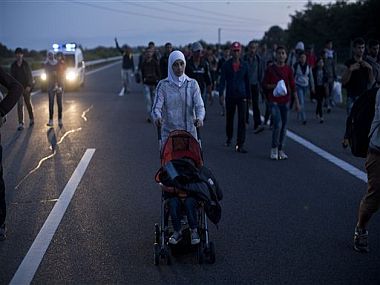Immigration was always going to be the deciding factor. In 2016, where advancement in technology and competition from lower-wages countries, especially in Asia, are responsible for the job scarcity, the easiest option is passing on the buck. And across Western nations, rich and developed communities that have seen their working and middle classes struggle with the aftermaths of the recession, the immigrant is the primary cause of one’s tribulations. What once were decent and well-paying jobs in the manufacturing industry have disappeared overnight because technology deemed it redundant and competition found a better alternative in Asian manufacturing hubs. The US President Barack Obama, said just this on national television. He explained that jobs that have left America for lower-wages countries are just never going to come back because of the aforementioned reasons. The same thing applies to Britain and the rest of Europe. Immigration is not helping the situation. Especially when a low-information voter sees his or her country accepting refugees from Syria and the Middle-east and Africa in large numbers, he or she looks at that as a slight by a politician who is supposed to be looking out not for the interests of someone from foreign lands, but for the real citizens of that country. And this referendum was a test of that. The writing was on the wall back in 2013 when much against the advice of his Private Secretary Ivan Rogers, David Cameron decided to call for this referendum when he did not have to. [caption id=“attachment_2853928” align=“alignleft” width=“380”]  Representational image. AP[/caption] Would the people of Britain accept unchecked immigration, with the free movement of people in European Union contributing to that? The LEAVE campaign worked hard in hammering the worst scenarios of immigration. If Britain stayed in the EU, jobs would continue to be lost to the undeserving immigrant, European and otherwise. The country would be spending much more on the member states of the EU than it would get from the EU. The NHS would cease to exist because the influx of immigrants would just overwhelm it. Towns and villages would look like those in Romania and Syria. These and the fear and concern they caused in the minds of the average Briton ensured a victory for the LEAVE campaign, a result whose repercussions will be felt heavily in different areas in the next days, weeks, and months. By a margin of four percentage points, Britain voted to leave the European Union 52% to 48%. It was a monumental victory for the LEAVE campaign. This was a campaign which, for the most part, parlayed on the fears of the threats of immigration, and the havoc that such unchecked immigration would cause, if Britan would remain in the EU. About quarter of an hour before 5 am local British time, the BBC called the referendum vote for the LEAVE camp. Steven Erlanger, reporting for The New York Times writes that the loss of Britain is a huge and enormous blow to the credibility of a bloc that is already under tremendous pressure from high unemployment, slow economic growth, the migrant crisis, and the debt woes and conflict of Greece and Ukraine respectively. The other big winner is the leader of the anti-immigrant and anti-European Union — The United Kingdom Independence Party (UKIP) — led by Nigel Farage. In the last Parliamentary elections, his party, even though it was able to win only one seat, managed to capture 12.6% of the vote. While the United Kingdom, because of its electoral system, was a first choice in a constituency, succeeded in keeping Farage and the UKIP out of parliament, its politics has accomplished something deeper and more alarming. The fear and hatred of the immigrant. In 2015, Britain had a net migration into its shores of 3,30,000 people, and the European Union accounted for more than half of those numbers. This referendum was going to be won or lost on the ability of either side to explain immigration the best. While David Cameron and the REMAIN camp countered the exaggerations of the LEAVE campaign, the looming fear of what a Britain overrun with immigrants might look like, tilted the referendum in favour of the latter. In 1975, the first referendum on Europe was held. Then it was the European Economic Community and had only 9 member states, and the anti-European sentiments had come from the Left and the Labour Party. Britons voted in favour of staying in the EEC by a margin of 2:1. In 2016, most of the opposition to a Britain in the European Union comes from the right and it follows a theme across Europe and even in the United States with the nomination of Donald Trump by a major American party as its Presidential candidate, of open nationalism. Far-right parties and movements are gaining in prominence and share of the electoral vote. Their main explanation for stagnation in wages, ever-increasing gaps in income, and disappearing manufacturing jobs, is the immigrant. And the sooner the presence and movement of the immigrant is curtailed, the better off everyone will be. How easily history finds a way to repeat itself.
Immigration was always going to be the deciding factor. In 2016, where advancement in technology and competition from lower-wages countries, especially in Asia, are responsible for the job scarcity, the easiest option is passing on the buck.
Advertisement
End of Article


)

)
)
)
)
)
)
)
)



